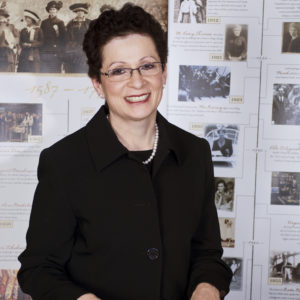Back to School – The History of Women College Presidents



Jill S. Tietjen, PE, is an author, national speaker, and…
When September and fall arrive, students head back to school and college. Although women college presidents are more prevalent today than ever, there is still a long way to go before we reach parity. This month, we are pleased to feature Elizabeth Agassiz, M. Carey Thomas, Johnnetta B. Cole, Donna Shalala, Shirley Ann Jackson, and Drew Gilpin Faust. Before we share their stories, think about the words of the cultural anthropologist, Margaret Mead. She wrote:
If we are to achieve a richer culture, rich in contrasting values, we must recognize the whole gamut of human potentialities, and so weave a less arbitrary social fabric, one in which each diverse human gift will find a fitting place.

The co-founder and first president of Radcliffe College, Elizabeth Agassiz was a researcher of natural history and she contributed scholarly works in that field. Born and raised in Boston, Massachusetts, Agassiz was a strong advocate for women’s education. She opened a school for girls in her home in 1856. One of the first woman members of the American Philosophical Society, she was one of the seven female managing directors of what was then called the “Harvard Annex.” The Annex provided an opportunity for women students to have instruction from Harvard professors, even though the women themselves could not enroll as Harvard students. In 1894, Agassiz was instrumental in transforming the Annex into what is today Radcliffe College. From 1900 to 1903, she served as their honorary president and helped to ensure the institution’s continuity.

The second president of Bryn Mawr College, M. Carey Thomas was turned down because of her perceived youth and lack of experience when she applied to be the inaugural president. She was hired, however, in 1884 as the dean of the college and chair of the English department. With her accumulated administrative experience and her exposure to what other colleges around the U.S. were doing, she was named president in 1894. She served as president until 1922 and as dean until 1908. Thomas was intent in ensuring that the admission standards were high and that academic rigor was maintained in the courses offered. During her tenure as president, several buildings were constructed on campus which brought collegiate Gothic architecture to the U.S. Thomas was an active suffragist and a proponent of the Equal Rights Amendment.

Over one hundred years after Thomas was selected, in 1987, Johnnetta B. Cole became the first African-American female president of Spelman College, a historically black college for women. An anthropologist, Cole pursued an academic career. At Washington State University, she co-founded a black studies program, one of the first established in the U.S. She helped establish the W.E.B. Du Bois Department of African-American Studies while at the University of Massachusetts, Amherst. As President of Spelman College from 1987-1997, Cole increased the ranking of the school, raised money to boost the endowment and increased enrollment. She has been the Director of the Museum of African Art, part of the Smithsonian Institution, since 2009.

The secretary of Health and Human Services in President Bill Clinton’s cabinet, Donna Shalala served as president of the University of Miami from 2001 to 2015. Prior to her government service, Shalala had served as the chancellor of the University of Wisconsin – Madison from 1988 to 1993. She was the first woman to serve as the leader of a Big Ten Conference school. While at the University of Miami, she spearheaded the effort to raise significant funds to increase its endowment. In addition, she taught a course every semester on the U.S. health care system. Today, she serves as the President of the Clinton Foundation. The recipient of more than 50 honorary degrees, Shalala has received the Presidential Medal of Freedom and has been inducted into the National Women’s Hall of Fame.

Nuclear physicist Shirley Ann Jackson became the president of Rensselaer Polytechnic Institute in 1999. During her tenure, RPI’s enrollment has surged, the endowment has increased significantly, its rankings have improved, and its level of research awards and expenditures has increased by orders of magnitude. The first African-American woman to receive a Ph.D. degree – in any field – from the Massachusetts Institute of Technology, she is the first African-American woman to lead a top-ranked research university. A trailblazer throughout her career, Jackson has held senior leadership positions in academia, government, industry and research. Jackson was appointed by President Clinton to chair the U.S. Nuclear Regulatory Commission. Earlier in her career, she worked for AT&T Bell Laboratories and Rutgers University. The citation accompanying her 2014 National Medal of Science reads: “For her insightful work in condensed matter physics and particle physics, for her science-rooted public policy achievements, and for her inspiration to the next generation of professionals in the science, technology, engineering and math fields.” Her many additional honors include induction into the National Women’s Hall of Fame.

Our final story is that of Drew Gilpin Faust. In 2007, she was selected as the first female President of Harvard University. Imagine that—Harvard has been around 400 years and they FINALLY selected a female president. Faust is an historian who has published six books. While President, she significantly increased the financial aid Harvard provides. Faust has been named a Fellow of the American Academy of Arts and Sciences and has received a number of honorary doctorates. In 2011, the National Endowment for the Humanities selected Faust for the Jefferson Lecture, the U.S. federal government’s highest honor for achievement in the humanities.
These women have worked to better education opportunities for many. They and many other women – almost all of them women we have not heard about and not learned about in school – across all fields of endeavor – more than 850 all together – are profiled in our book, Her Story: A Timeline of the Women Who Changed America. Help us by continuing to tell women’s stories and write women back into history!
Copyright © 2017 Jill Tietjen and Charlotte Waisman all rights reserved
Charlotte S. Waisman, Ph.D., and Jill S. Tietjen, P.E., co-authors of Her Story: A Timeline of the Women Who Changed America (HarperCollins) and recipients of the Daughters of the American Revolution History Award Medal. Charlotte is a national champion and advocate for women as a professor and keynote speaker. A corporate leader, executive coach, and facilitator, she conducts leadership workshops nationally. Jill is an author, speaker, and electrical engineer. She has been inducted into the Colorado Women’s Hall of Fame.
Author: Jill Tietjen
Jill S. Tietjen, PE, is an author, national speaker, and an electrical engineer. After 40 years in the electric utility industry, her professional focus is now on women’s advocacy, worldwide. She blogs for The Huffington Post, speaks nationally on the accomplishments of women, nominates women for awards, and continues to write books (8 published to date), following in the footsteps of her bestselling and award-winning book, Her Story: A Timeline of the Women Who Changed America (written with Charlotte Waisman). She is a frequent keynote speaker as her positive energy and her ability to relate to the audience result in inspired and energized listeners. The recipient of many awards, her induction into the Colorado Women’s Hall of Fame in 2010 remains one of her most treasured.

Jill S. Tietjen, PE, is an author, national speaker, and an electrical engineer. After 40 years in the electric utility industry, her professional focus is now on women’s advocacy, worldwide. She blogs for The Huffington Post, speaks nationally on the accomplishments of women, nominates women for awards, and continues to write books (8 published to date), following in the footsteps of her bestselling and award-winning book, Her Story: A Timeline of the Women Who Changed America (written with Charlotte Waisman). She is a frequent keynote speaker as her positive energy and her ability to relate to the audience result in inspired and energized listeners. The recipient of many awards, her induction into the Colorado Women’s Hall of Fame in 2010 remains one of her most treasured.


